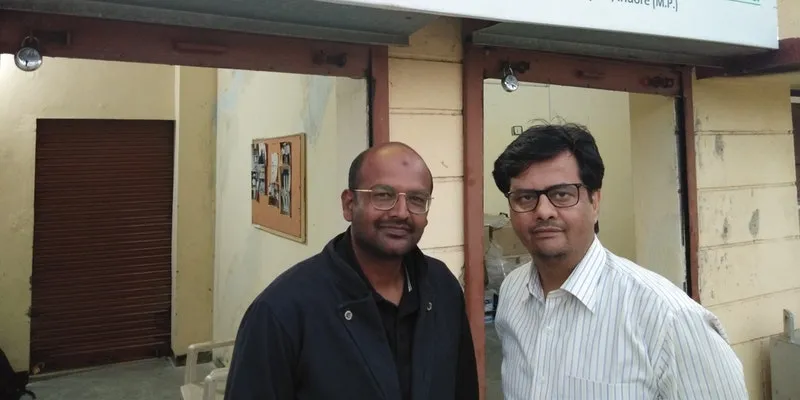[Startup Bharat] This Indore-based startup is using nano tech to provide clean, affordable drinking water
MW Social Enterprise is using nanotechnology and manufacturing to produce affordable water purifiers with filters that need replacing only once every couple of years.
There are some things that should be a given. Access to clean drinking water is one of them. However, a majority of people in the world drink unclean water - not due to lack of awareness, but lack of access to a purification system.
While urban households today pay between Rs 6,000 and Rs 15,000 for water purification systems, they are unaffordable for many. And MW Social Enterprise is looking to change that.

MW Social Enterprise Co-founders Mankaj Singh and Waseem Iqbal.
The research and development centre, located at Electronics Complex in Indore, has partnered with the Council of Scientific and Industrial Research- Advanced Materials and Processes Research Institute (CSIR-AMPRI) and various other stakeholders to create a bridge between research, development, and the end user.
Also read: Waseem Iqbal's water filter aims to bring clean drinking water to millions - can you help?
Technology that brings down cost
“We are bridging the gap to provide clean drinking water in three ways. First, we produce water purifiers in partnership with some producers and create awareness about them. Two, we aggregate and promote different technologies as per the need of the community. For this, we make technology accessible for companies making water purifiers. Three, we provide services to end users such as maintenance of filters,” says Co-founder Mankaj Singh (44).
The nano technology-based water filtration technology from CSIR-AMPRI is economical and does not need electricity to produce water filters. MW Social Enterprise has so far succeeded in installing purifiers in several households in slum areas and in villages. A single-grid purifier costs only Rs 1,500. What’s more, the filter, which costs Rs 500, needs to be replaced only every two years.
MW Social Enterprise also collaborates with other government science labs to simplify the production process so that water filters can be mass produced. “We have partnered with a research institute and developed a filter for treating these substances at an affordable cost,” says Co-founder Waseem Iqbal.
Waseem has a post-graduate degree in social science, is a Leeds Fellow and has more than 12 years of experience in the development sector providing market-driven solutions for different issues. Mankaj is an IIM-Ahmedabad alumnus with over 16 years of experience in the social sector, including water and sanitation.
Waseem and Mankaj met while working on a project and decided to work towards addressing their shared concerns about the need for affordable water purifiers. They founded MW Social Enterprise in 2016.
MW Social Enterprise partnered with CSIR-AMPRI in January 2018 and the nano technology-based filter they have developed can be used for treating water contaminated with arsenic, fluoride, and heavy metals.
While the water purification technology is developed and certified by CSIR-AMPRI, MW Social Enterprise sources raw materials and partners with manufacturers for the final filter.
“By April 2018, the research and development centre was established, and we were able to develop a cost-effective technology. We conducted our testing in the villages of Uttar Pradesh and Madhya Pradesh, collaborated with people who were already producing filters, and built alliances with manufacturers. Today, we stand at a capacity of producing 60,000 filters per year,” Mankaj says.
Focus on nano tech
“We purify water using a chemical called Nano Alumna. But the process is complicated, and costs are high. So, we built a system that would produce the same chemical at a lower cost. With limited resources, we are now producing five times more nano-adsorbent material than what the research labs could produce,” Waseem says.

The filter was tested in several areas, including at Gajipur in Uttar Pradesh.
“We have started getting inquiries for our product and we plan to reach three districts of Madhya Pradesh by March. Meanwhile, we have started selling filters to targeted groups and are conducting educational stand-ups,” he adds.
But how willing is the targeted group? “We follow a process of first conducting a survey on our mobile app in the area. We take the feedback of people. Also, the water purifier is determined by the kind of water supply in the area, and how many members there are in a family. A family of three to four people can do with a single-grid purifier, while one with more consumption may need a double or triple-grid purifier,” Mankaj says.
The process of purification
Nano-adsorbent material has excellent absorption capacity for contaminants such as fluoride, arsenic, and heavy metals. The nano-adsorbent coating in the filter has a positive charge, and all negative-charged inorganic contaminants like fluoride and arsenic get absorbed. The nano particles also have a porous structure and the particles in the coating form a channel from one particle to another. Thus, when water passes through this channel, it also destroys bacteria and viruses.
MW Social Enterprise's revenue comes from selling the water filters it makes, and the fees it charges for operation and maintenance of other filters.
On the company’s future plans, Wasem says, “We are open for partnerships for resources with value. In the coming year, we want to open our distributor network in India and expand in the African market.”


![[Startup Bharat] This Indore-based startup is using nano tech to provide clean, affordable drinking water](https://images.yourstory.com/cs/2/717ee640-b0f8-11e8-ac49-d10dfcb04889/MWSEFounders%20Mankaj%20and%20Waseem1550762736236.jpg?mode=crop&crop=faces&ar=2%3A1&format=auto&w=1920&q=75)




